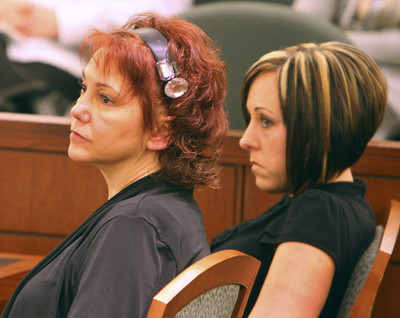Lawsuit alleges MountainView negligence
On the night of Nov. 4, 2005, Morton Scheinbaum dropped dead in MountainView Hospital's emergency department.
This week, a jury began hearing evidence about the moments that preceded the 59-year-old man's death.
Lanny Waite, a lawyer representing Scheinbaum's loved ones, told jurors the nursing staff negligently "and possibly maliciously" withheld treatment for precious minutes after he arrived with complaints of chest pain and shortness of breath.
Hospital attorney Michael Prangle, on the other hand, said the nurses working in the busy department "did everything they could reasonably be expected to do that night."
"The law does not require us to be perfect," Prangle told the jury.
Linda Scheinbaum, Morton's wife of 20 years before the couple divorced in 2002 for financial reasons, and Wendy Cannon, the man's daughter from a previous marriage, filed a medical malpractice lawsuit against the hospital in June 2006. The case went to trial this week in District Judge Valorie Vega's courtroom and is expected to last through next week.
Waite claims 41 minutes passed from the time Morton Scheinbaum arrived at MountainView Hospital until he received any hands-on treatment.
No one disputes that Morton Scheinbaum, a lifelong Las Vegas resident, had a history of heart trouble. He had his first heart attack at the age of 36, when he was diagnosed with coronary artery disease, and suffered his second heart attack about a week before his death.
But Waite said evidence will show that the nursing staff's substandard care -- and not Morton Scheinbaum's underlying medical condition -- caused his death.
When Morton Scheinbaum came to the MountainView emergency department on both Oct. 25, 2005, and Nov. 4, 2005, the lawyer said, he was having symptoms that were caused by a heart rhythm disorder called atrial fibrillation -- not coronary artery disease.
Waite said Morton Scheinbaum received appropriate treatment during the earlier visit and was released three days later with instructions to return to the hospital immediately if he experienced additional problems. Atrial fibrillation can be fatal to someone with Scheinbaum's underlying medical condition, the lawyer said.
Linda Scheinbaum, the first witness in the trial, said Morton woke her up at 10 p.m. on Nov. 4, 2005, and told her he was experiencing an irregular heart beat. The couple had continued to live as husband and wife since their divorce.
On the way to the hospital, Linda Scheinbaum testified, Morton began experiencing chest pain. The pair arrived at 10:30 p.m. at the emergency department, where a red sign tells patients to notify a triage nurse if they are having chest pains.
Linda Scheinbaum said the couple approached a woman who was gathering information from another patient and were told, "Sit down and wait your turn." The woman since has been identified as triage nurse May Taylor.
But Linda Scheinbaum persisted. She testified that she told Taylor her husband was experiencing chest pains, and Taylor told her, "You must be patient like everyone else. I will get to you."
Within a few minutes, Linda Scheinbaum said, Morton put his head on the desk. Linda Scheinbaum told Taylor he had been to the hospital with heart problems a week earlier, but Taylor continued to make them wait.
When Taylor finished with the other patient, she began asking Morton Scheinbaum questions, such as his name and address.
"She kept asking him questions, even though I kept answering them," Linda Scheinbaum testified.
She said she had a "forceful" demeanor when she first approached Taylor, but she quickly lost her temper. She said she had no idea Taylor was a triage nurse.
"The more she kept telling me to wait, the more panicked I was getting," Linda Scheinbaum recalled.
When the time came for Morton Scheinbaum to go for an electrocardiogram, Waite told the jury, Taylor neither accompanied him nor retrieved a wheelchair for him. He walked back on his own, the lawyer said, "and you're going to find out that is a big no-no."
Waite said the EKG technician then left Morton Scheinbaum alone to show the test results to a physician, who wrote "bring patient back now" at the top of his chart at 10:50 p.m. with the word "now" underlined.
Linda Scheinbaum said she next saw Morton when he walked back out to the waiting room by himself. "They told me they don't have a bed," she recalled him telling her. "I have to wait."
She said he then sat in a chair. "He said, 'I'm going to have a heart attack,' clutched his chest and started to make this moaning sound."
Linda Scheinbaum said she began screaming at the top of her lungs: "He's having a heart attack."
She described how she watched as his eyes rolled back and his face was distorted by the pain. He then slumped over and fell on the floor.
A pregnant nurse arrived with a wheelchair, and Linda Scheinbaum said she helped lift Morton into it before he fell out of the chair and back onto the floor. The nurse then called for a security guard.
"The next thing I knew there was a gurney coming," Linda Scheinbaum said. She said she saw no one start CPR before Morton was wheeled away.
Prangle said a nurse immediately hopped up on the gurney and began performing chest compressions.
While Linda Scheinbaum waited for news, Cannon arrived. A doctor soon came and asked to speak with them privately.
"She said they did everything they could to save him, but he only had a few moments left," Linda Scheinbaum recalled.
The two women went to Morton Scheinbaum and said their goodbyes, and he was pronounced dead at midnight.
As the grieving women began to leave the hospital, a woman approached them and said she had witnessed everything that had occurred in the waiting room.
She offered to give them her name and telephone number, as did others in the waiting room, "because they could not believe what had occurred," Waite said.
The lawyer said hospital representatives first attempted to explain their conduct that night by saying the emergency department was full when Morton Scheinbaum arrived, but records later revealed that only 18 of the 22 beds were occupied at the time, and several of the patients in those beds were not critically ill.
In his opening statement, Prangle said two nurses had called in sick that night.
"You don't open rooms unless you can staff them," he told the jury.
Prangle said evidence will show that Morton Scheinbaum died because his heart had suffered too much damage over the years.
The nurses "did the best they could for Mr. Scheinbaum under the circumstances," he said.
Contact reporter Carri Geer Thevenot at cgeer@reviewjournal.com or 702-380-8135.

























